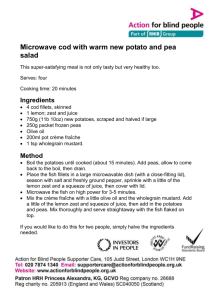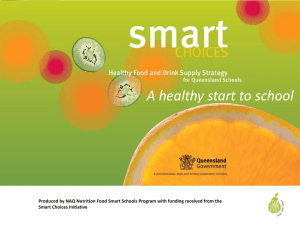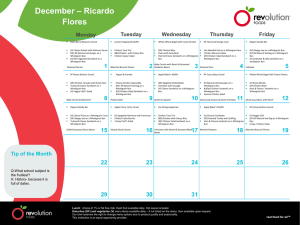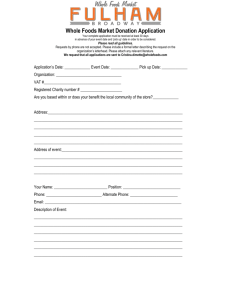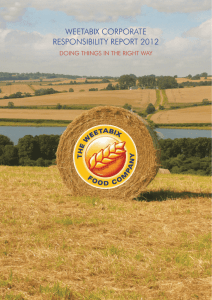The Goodness of Wholegrain
advertisement
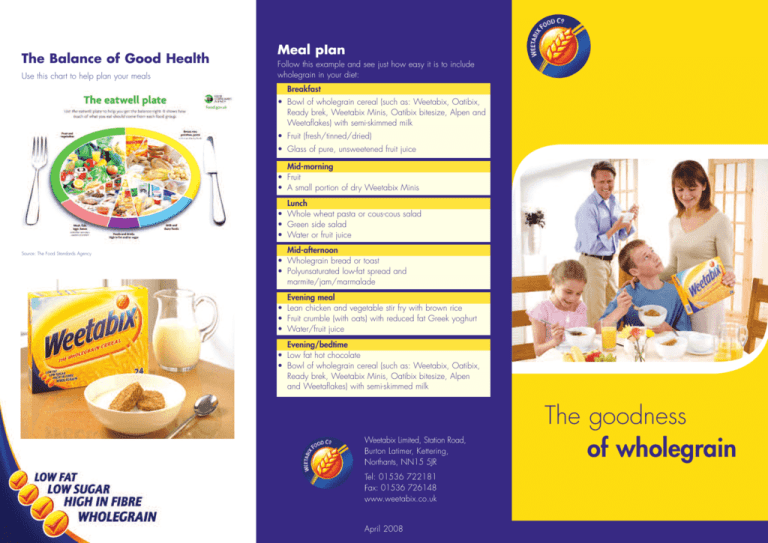
The Balance of Good Health Use this chart to help plan your meals Meal pIan Follow this example and see just how easy it is to include wholegrain in your diet: Breakfast • Bowl of wholegrain cereal (such as: Weetabix, Oatibix, Ready brek, Weetabix Minis, Oatibix bitesize, Alpen and Weetaflakes) with semi-skimmed milk • Fruit (fresh/tinned/dried) • Glass of pure, unsweetened fruit juice Mid-morning • Fruit • A small portion of dry Weetabix Minis Lunch • Whole wheat pasta or cous-cous salad • Green side salad • Water or fruit juice Source: The Food Standards Agency Mid-afternoon • Wholegrain bread or toast • Polyunsaturated low-fat spread and marmite/jam/marmalade Evening meal • Lean chicken and vegetable stir fry with brown rice • Fruit crumble (with oats) with reduced fat Greek yoghurt • Water/fruit juice Evening/bedtime • Low fat hot chocolate • Bowl of wholegrain cereal (such as: Weetabix, Oatibix, Ready brek, Weetabix Minis, Oatibix bitesize, Alpen and Weetaflakes) with semi-skimmed milk Weetabix Limited, Station Road, Burton Latimer, Kettering, Northants, NN15 5JR Tel: 01536 722181 Fax: 01536 726148 www.weetabix.co.uk April 2008 The goodness of wholegrain Many food products contain refined grains, with the result that certain useful parts are lost. Removing the bran outer layer can result in a significant loss of nutrients whereas wholegrain cereals have the nutritional benefits of all the component parts. Wholegrain varieties include wheat, oats, corn, rye barley, spelt, millet and linseed What are you made of? A diet rich in wholegrains also tends to be high in fibre and low in fat. As part of a healthy balanced diet, a large serving of wholegrain should be encouraged at mealtimes. Wholegrains belong to the starchy foods group. This includes: Bread, rice, chapattis, pasta, noodles What we eat is the topic of our time as the nation finally wakes up to the fact that the food we eat directly affects our health and wellbeing. Everyone in the family, both young and old, is now thinking about what they eat. Starchy root vegetables like potatoes Oats, breakfast cereals Good nutrition through eating a balanced diet is essential for normal growth and development. It is therefore vital that we know what constitutes a healthy diet. Certain snack foods – crackers, rice cakes, oat cakes. These foods provide us with energy, fibre and key vitamins and minerals such as B vitamins and zinc. About one third of our overall food intake should come from this group and each meal should be based on these foods. Along with this greater health awareness has come diet mania. So out of all the new wonder foods and fad diets, how do we know what is actually good for us? Wholegrain goodness… Choose wholegrain foods when you shop by looking for the word ‘wholegrain’ on either the ingredients label or the front of the pack. It’s official, wholegrains are the expert’s healthy choice. Recent scientific evidence shows that wholegrains are good for you - yet more than 90% of adults and children in the UK are not eating enough of them! So find out more… Wholegrains are cereal grains such as wheat and oats that contain literally the whole of the grain. The grain consists of three parts (see diagram): the endosperm (starchy middle layer) the germ (nutrient rich inner layer) and the bran (fibre containing outer layer) What foods contain wholegrain? Endosperm Examples of wholegrain foods are: The benefits… Scientific research has shown wholegrains, particularly cereals, have health benefits. As part of healthy lifestyle, wholegrains may help to: Maintain a healthy heart People with a healthy heart tend to eat more wholegrain foods as part of a healthy lifestyle. Bran Wheat Germ Keep the digestive system healthy Wholegrains contain insoluble and soluble fibre. The soluble fibre in oats may help to reduce the amount of cholesterol in the blood. Wholegrain breakfast cereals, such as Weetabix, Oatibix, Ready brek, Weetabix Minis, Oatibix bitesize, Alpen and Weetaflakes. Brown rice, whole wheat pasta, wholegrain crackers and wholegrain breads.
